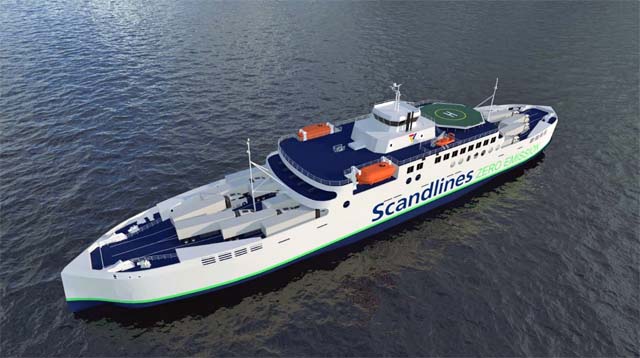Ferry operator Scandlines has chosen ReFlow, a Danish climate tech company, to develop advanced climate twins of its latest freight ferry design using life cycle assessment (LCA) methodology.
Steel is currently being cut at Cemre Shipyard in Turkey for the zero-emission electric vessel contracted by Scandlines for the Puttgarden-Rødby route. Over the following months, ReFlow will build a detailed life-cycle model representing the vessel from its construction to its end of life many years from now. The model will show the environmental impact of the ferry, not only in its use but also from its construction at Cemre Shipyard along with the installed equipment. The digital ‘climate twin’ will make it possible for Scandlines to run simulations on the use of new green technology on the ferry – something that is considered nearly impossible today.
LCA is a holistic approach to assessing the environmental impact. It can include all life cycle stages of a vessel and not just the fuel consumption that is common practice in the maritime industry. Incorporating all life cycle stages, the shipowner will get a complete overview of the vessel’s emissions in its entire life, including fuel consumption.
Fini A Hansen, VP Fleet, Scandlines, said: “Our new zero-emission vessel will be electrically powered, so it makes good sense for us to look at the entire life cycle and understand the remaining emissions so they can be improved over time.”
The ferry will be environmentally assessed using ISO-backed LCA methodology – a tool well-known in other industries but relatively new to maritime.
Rasmus Elsborg-Jensen, CEO and Founder, ReFlow, said: “We are very excited about the new cooperation and also looking forward to the world premiere of applying life cycle assessment to a complete ferry – it is an industry first to our knowledge.”
The assessment of the ferry design and its proposed life cycle is no small task. It will run over the next three months and include detailed information on the building processes and chosen equipment aboard.
Elsborg-Jensen added: “It is our ambition to provide Scandlines with a granular understanding of the emissions associated with, not just the fuel use, but also the vessel itself, allowing for future “plug and play” scenarios where new greener technologies can be assessed on the vessel before an investment.”
The EU highlights the use of LCA as the go-to tool for providing environmental data on products and processes. New EU initiatives like the Green Deal call for more environmental data and product transparency, and Life Cycle Assessment provides exactly that.
“Using life cycle assessment, the shipowners can get a more granular understanding of the current environmental profile of a vessel but also, more importantly, understand the future roads towards a greener vessel – a patch that often is linked with partnerships and new technologies,” Elsborg-Jensen concluded.
ReFlow will, jointly with the traditional LCA process, incorporate the digital solution that makes it possible for suppliers to make and submit their LCA calculations directly to Scandlines, speeding up the process when selecting new or evaluating current suppliers. Several maritime OEMs are already using the digital platform, which makes it possible to cut the time and cost associated with a life cycle assessment of the products by over 80% compared to traditional manual approaches.
Hansen said: “The digital solution from ReFlow will be a good enabler for our green procurement strategy as it allows our current and future suppliers to provide climate data on their products. Product climate data will allow us to evaluate products and eventually lower the carbon footprint over time.”



